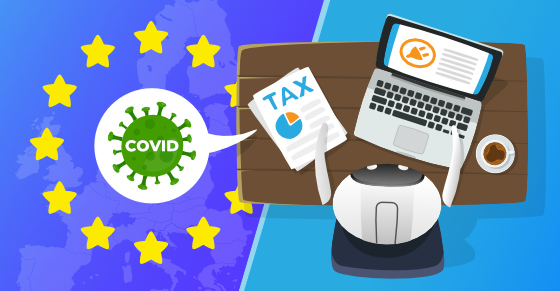|
|
For software product makers, nothing is certain in life except for (death by) support tickets and taxes 😩 and we’ve got some bad news for those who are lax on the latter. In a few weeks, US software sellers who are still not handling VAT in Europe will need to deeply reevaluate their stance towards EU VAT collection. Moreover, they may also be liable for massive fines retroactively.
We’ve had plenty of conversations with US sellers about EU VAT and found that many aren’t overly concerned with compliance. After all, it’s unlikely EU authorities will go after a small US software business because piecing together a complete picture of its sales volume is next to impossible. Not to mention figuring out if an audit is worth the legal effort in the first place.
Bad news: this ‘tax camouflage’ is about to wear off.
As of January 2024, the European Union (EU) will require payment processors like Stripe and PayPal to report cross-border data to EU VAT authorities, which they will use to pursue legal action against noncompliant buyers and — based on our projection — potentially even ban them from selling in EU countries down the line.

Before we unpack what the latest change means for you and your software business, a quick refresher about European Value Added Tax (aka EU VAT).
What Is EU VAT?
In 2015, the EU implemented a significant change in its VAT rules for digital goods and services, aiming to adapt to the digital economy. The reform introduced destination-based taxation, meaning that VAT is applied based on the location of the consumer rather than the supplier. This change also applies to suppliers within or outside the EEA (European Economic Area), including US sellers. It was intended to level the playing field for businesses operating in the digital sphere and ensure fair taxation across member states.
In other words, if you’re selling software or SaaS, you have to charge VAT at the rate applicable in the customer’s country (aka Member State). This rule is intended to prevent businesses from exploiting lower VAT rates in certain jurisdictions.
What Changed With EU VAT Compliance?
As mentioned, from January 1st, 2024, the EU will require payment processors to report cross-border data to tax authorities. This forms part of an EU-wide action plan to combat fraudulent cross-border online transactions. If you are a US-based software business making more than 25 sales per quarter in Europe, it will get logged by your payment processor in a database called the Central Electronic System of Payment Information (CESOP), which is accessible to the relevant local authorities.
Unlike US sales tax, which typically requires a minimum sales volume in a specific state before a seller becomes liable, the situation with EU VAT is more complex. In the European Union, there are no thresholds to cross before becoming liable for VAT; businesses must handle VAT from their very first transaction. This means that if you’re a US seller conducting business in Europe, you are exposed to EU VAT obligations from the outset, regardless of the sales volume or the specific European countries in which you’re selling. The absence of minimum sales thresholds in the EU makes it imperative for businesses to address VAT compliance from the beginning of their cross-border operations.
In Freemius’s experience, European tax authorities are extremely diligent. We’ve had cases where EU countries have contacted us for relatively negligible outstanding amounts of a few Euros. The point is that these authorities are painstakingly rigorous — if they’ll go after you for €10, imagine the extent of their pursuit for €100,000.
Dodging EU VAT is going to be a big no-no from 1 January 2024 going forward. But while paying up sucks in-and-of itself, noncompliance could also pose additional pitfalls.
EU VAT Noncompliance: Where’s It All Headed?
The future doesn’t look good, I’m afraid.
After an internal team discussion, it feels like the direction things are moving in will probably lead to a natural progression from the new 2024 EU VAT rules. What does this mean? Plainly put: If you’re selling in EU countries and not handling EU VAT properly, you run the risk that payment processors like Stripe or PayPal will block your ability to sell in Europe — whether in specific countries or the entire EU.
In a worst-case scenario, EU VAT authorities could prohibit payment processors from handling transactions for noncompliant sellers or those with outstanding VAT until their debts are settled.
Big payment processors likely won’t even blink over the decision to block small sellers to satisfy the EU. For these companies, big enterprises (who are compliant) bring in the real money: small-scale software sellers make up a pretty negligible proportion of their profits.

Feeling keen to get your EU VAT affairs in order yet?
How to Be EU VAT-compliant
While paying taxes is bad enough 💩 becoming EU VAT-compliant as a digital seller is a pain in the ass multifaceted maze of neverending admin. There are two routes you can take: either handle everything yourself or go the safer, easier way: use a payments solution that is also a merchant of record (MoR).
Consider a merchant of record as a powerful solution that not only handles your payments, subscriptions, and invoices but also takes care of the headache of dealing with EU VAT for you.
With an MoR like Freemius, you don’t have to fret about global sales taxes as we are liable for every payment made and keep track of and compile all due sales tax payments, ensure PCI compliance, and handle fraud, refunds, and chargebacks.
We monitor EU VAT rate updates for each EU country, automatically update subscription renewals upon VAT rate changes, and do everything else that’s needed to be compliant. If we mess up, the liability becomes our responsibility; you won’t have to worry about a thing 🍸
If you’d prefer to handle EU VAT yourself, here’s a breakdown of what you’ll need to do:
The EU VAT Compliance Process
Complying with regulations as a software seller involves a combination of technical and non-technical steps. Here’s a detailed guide that breaks both down:
Technical Steps
Update Checkout Process: Implement a system that identifies the buyer’s location during the checkout process. This can involve using geolocation tools or asking customers to provide their location information.
Validate VAT Identification Numbers (VATIN): Provide a field for customers to enter their VAT Identification Number (VATIN) during the checkout process and implement validation checks to ensure the accuracy of the provided VATIN.
Apply the Reverse Charge Mechanism: For business-to-business (B2B) transactions across EU member states, implement the EU VAT reverse charge mechanism. This involves adjusting your invoicing system to indicate that the reverse charge applies and that the buyer is responsible for accounting for the VAT.
Customize Invoices: Ensure that your invoices include all the required information, such as your and the customer’s VATIN, a clear indication that the reverse charge applies, and details of the transaction.
Implement VAT Rates: Configure your system to apply the correct VAT rates based on the buyer’s location. EU member states have different standard and reduced VAT rates.
Keep Detailed Records: Maintain comprehensive records of each transaction, including customer details, and three pieces of evidence of their location (e.g., billing address, IP address, banking details, landline location).
Non-Technical Steps
Register for VAT: Register for EU VAT with a One Stop Shop (OSS) account in any EU country.
Regularly Monitor and Update: Stay informed about changes to EU VAT regulations and VAT rates, and update your systems accordingly to ensure ongoing compliance. Example of EU VAT changes during COVID and their impact.
Subscribe and grab a free copy to start Mastering SEO on the WordPress.org Repository
Make the WordPress.org search algorithm work for you with actionable tips to rank your plugin higher.

The Time to Comply With EU VAT Is Now
The new EU VAT updates are around the corner, and getting your ducks in a super straight row has never been more important. European authorities are on a mission to make sure everyone — including US sellers — pays their tax bills, and it’s a very good idea to put your house in order sooner rather than later.
If you have additional questions about EU VAT or would like to sign up for our services, please get in touch with us at [email protected].







